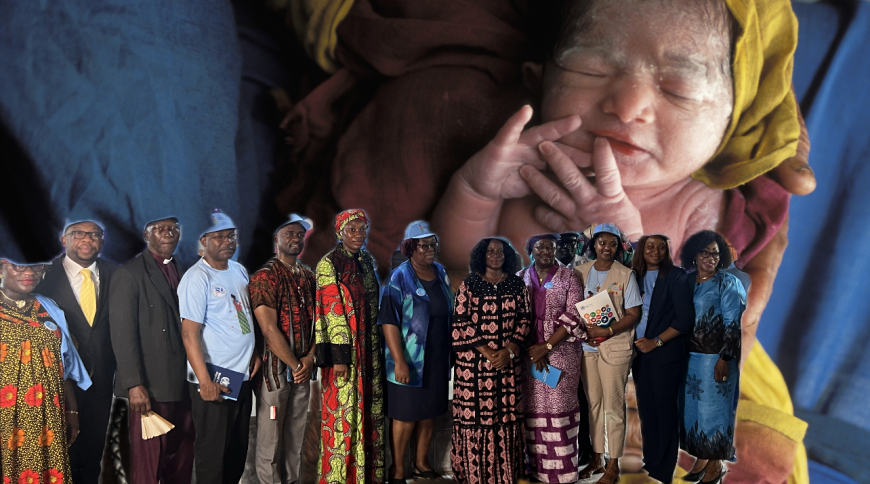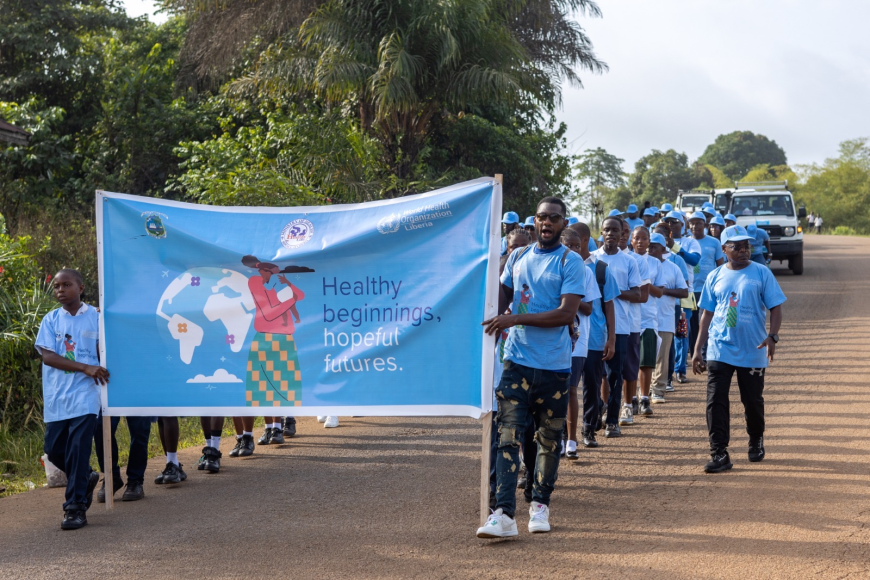World Health Day 2025: WHO Calls for Action to End Preventable Maternal and Newborn Deaths

Bentol Montserrado County, Liberia: Liberia joined the global community on April 7 in commemorating World Health Day 2025, under the international theme “Healthy Beginnings, Hopeful Futures.”The national observance was held in Bentol, Montserrado County, with a primary focus on reducing maternal and neonatal mortality a pressing public health issue in the country.
The event brought together a host of dignitaries and key stakeholders, including Senate Pro Tempore Nyonblee Karnga-Lawrence, Senator Dabah Varplah of Grand Cape Mount County, representatives from the Office of the First Lady, health professionals, students, and Liberia’s development partners.
Senator Karnga-Lawrence officially launched the ceremony with a passionate plea for urgent reforms in maternal healthcare. She underscored that the majority of maternal and newborn deaths in Liberia are preventable with timely and quality medical intervention. Citing recent data, she noted that 37 out of every 1,000 newborns in Liberia die—a figure far above the continental average.
Dr. Sule, the World Health Organization’s officer-in-charge in Liberia, emphasized the need for high-level investments in maternal and newborn health services, including antenatal care, skilled birth attendance, emergency obstetrics, and postnatal care. He also called for expanded access to quality care, especially in hard-to-reach and crisis-affected areas. Dr. Sule urged the Liberian Legislature to enact and uphold laws that protect the health rights of women and children, advocating for maternity protection and access to sexual and reproductive health services.
Meanwhile, Senator Dabah Varplah extended heartfelt appreciation to Liberia’s frontline health workers—doctors, midwives, trained birth attendants, nurses, and volunteers—for their dedication in tackling maternal and newborn mortality. She described the issue as not merely a health concern, but a barometer of the country’s healthcare strength and overall development.
“A strong healthcare system starts with strong maternal and newborn care,” Senator Varplah emphasized.
To further strengthen national efforts, Senator Varplah announced that in April 2024, the Government of Liberia, through the Ministry of Health, appointed the First Lady as National Champion, and herself as Co-Champion for Maternal and Newborn Health.
The national World Health Day celebration concluded with renewed commitments from government, civil society, and international partners to work collaboratively toward healthier beginnings and more hopeful futures for all Liberian mothers and children.
Despite notable progress over the past decades, maternal and newborn mortality remain critical global health challenges. Every year, nearly 300,000 women die due to pregnancy or childbirth-related causes, while 2.3 million newborns die within their first month of life, and 1.9 million are stillborn. The vast majority of these tragedies occur in low-income and fragile settings — with the WHO African Region bearing the heaviest burden.
In Africa, the statistics are stark: 20 mothers and 120 newborns die every hour, totaling 178,000 maternal and 1 million newborn deaths annually. Globally, every seven seconds, a woman or child dies from preventable causes.
“These are not just numbers,” said a WHO spokesperson. “Each statistic represents a life lost, a family devastated, and a future unfulfilled.”
New data released today reveals that four out of five countries are projected to miss global targets for maternal survival by 2030. Additionally, 65 countries are off-track in reducing newborn deaths, and 60 – most of them in the African Region – are not on pace to achieve child mortality reduction goals.
In response, the WHO African Region is launching a year-long campaign anchored in the World Health Day theme. It supports the commitments made by Member States in World Health Assembly Resolution 77.5 and aligns with global Sustainable Development Goals (SDGs).
Progress and Challenges
While the road ahead is steep, there is cause for hope. Many African nations are actively improving maternal and newborn health through enhanced health worker training, better care services, and digital health innovations. In Sierra Leone, for example, a WHO-supported, government-led initiative has significantly improved outcomes by upgrading health facilities, training personnel, and investing in health system strengthening.
Yet, many challenges persist — including underfunded health systems, lack of infrastructure, critical shortages of healthcare workers, ongoing conflicts, emergencies, and the growing impacts of climate change. These issues disproportionately affect women and children, especially in remote and conflict-affected regions.

Additionally, global cuts to health and development aid threaten to undermine progress, with some life-saving programs already suspended and crucial research on maternal and child health impacted.
To reverse these trends and ensure healthier futures for mothers and babies, WHO is launching two key reports today. These reports provide evidence-based strategies and emphasize the need for stronger investment and multisectoral collaboration.
Investing in high-impact maternal and newborn services, such as antenatal care, skilled birth attendance, emergency obstetric services, and postnatal care.
- Expanding access to quality care in underserved and crisis-affected areas.
- Enacting and enforcing legal protections for women and children, including access to sexual and reproductive health services.
- Addressing the social and economic drivers of health inequity.
- Strengthening accountability and innovation at every level of the health system.
Every dollar spent on maternal and newborn health delivers outsized returns — healthier families, more resilient societies, and brighter futures.
As we mark World Health Day 2025, let us reaffirm our shared responsibility to ensure that every mother and every baby in Africa — and around the world — is given the chance for a healthy beginning and a hopeful future.
What's Your Reaction?







































































